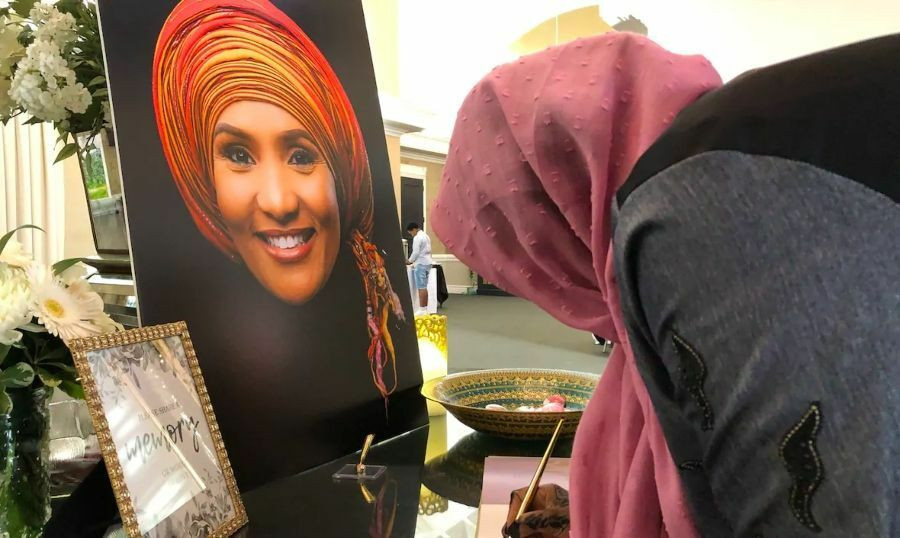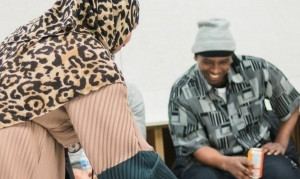African writers like Wainaina and Chimamanda Ngozi Adichie have challenged how the continent is portrayed in literature and by Hollywood and the media. Hodan Nalayeh, a Black Canadian-Somali journalist, was at the forefront of challenging the negative imagery that has become associated with her country of birth. While doing this important work, Hodan was killed in a terrorist attack in Kismayo on July 12. She was pregnant at the time; her husband, Farid Jama Suleiman, was also killed. In total, 26 people were killed, including a local politician and the journalist Mohamed Omar Sahal.
Hodan was my friend. We met in university. We shared a love of music, and neither of us took no for an answer. We both wanted to work in media. At the time, Hodan was studying communications in Windsor, and I was studying journalism at Ryerson. We were both desperate to break into the industry and devoted our spare time to volunteering at the school radio station and/or writing for the school paper. One year, we managed to save enough money to travel to a music conference in Miami. We lost touch soon after, but five years ago, we reconnected. We were both mothers of two — her boys a little older than my children. She had faced challenges and overcome them. She was now a single mother and running her own business. She had bought a home for her children on her own and had gone back to school to pursue journalism. That “never take no for an answer” light was brighter than before, and, after decades apart, we picked up where we had left off.
We had both wanted to work in media because we saw what wasn’t being covered when it came to what life was like in Africa. I was so impressed with what she was doing with her show, Integration TV, at the time airing on Omni TV, that I invited her to appear on The Agenda.
When I asked her why she had wanted to do a show, she said, “Part of the reason why I actually wanted to do this, because I’m a mom, I have two children, and I want them to have good confidence and self-esteem about who they are. I’m just as Canadian as I am Somali, so I think it’s okay to have cultural awareness of who you are. This is where you come from; it’s a diverse country. If we teach our children to be comfortable in their own skin, we create a better society.”
My family fled Uganda during the 1980s civil war. When I returned for the first time, in the mid-’90s, during university, I found myself asking, “Why me?” While we were still in the refugee camp, family and friends had told me how lucky I would be to live in Canada. Going back confirmed they’d been right. I was a girl. I was going to school. I didn’t think that marriage would be my way out of poverty. But I felt the guilt of having survived, and I still do.
I spoke to Hodan about this. You ask yourself, “Why me?” and you try to take advantage of all of the opportunities you wouldn’t have had if you’d grown up back home. For Hodan, I think that meant having choices about how and where to live. She left the comfort of Canada — if you’re familiar with life on the continent, even load-shedding can take some adjusting to. She was brave and selfless, and she used the knowledge she had acquired here to create a network for Somalis in the diaspora and back in Somalia. It was her life’s work.
At her memorial, her niece said that, while she had difficulty speaking Somali, her auntie had always encouraged her to keep trying. Hodan herself had become fluent because she knew that she needed to speak it in order to be able to communicate. She didn’t ask anyone to meet her where she was; she went to where she knew her community would be. She also showed that by moving to Somalia. She went to where the stories were. She wanted to see how things were on the ground.
When people find out that I lived in a refugee camp, they often feel pity. While I appreciate their concern, I share that I also have many happy memories of life in the camp. There was community. There were celebrations. A lot of life was lived there. Hodan wanted people to see the life that was happening in Somalia despite the political unrest. She wanted us to see the strength and resilience of the people and the physical beauty of the country. This mattered to her and matters to people who come from countries that some have called shitholes. Like Canada, these places have many dimensions.
At Hodan’s memorial, her family and loved ones reminded us to not give up and to have hope. They offered us comfort and said that we shouldn’t think of how she died but of how she lived. She didn’t believe in limitations. She lived with purpose. She was compassionate and patient. When I interviewed her, I asked her why she was always so positive. “I think it’s just realizing that this life is short,” she said. “If you don’t take advantage of the opportunities you have in life to do something good in this world, what good are you? We all can do something different. You don’t have to be on TV like me. You could be the mom at school that bakes cookies for the kids in your class. You can be the man that gives kids soccer lessons. We all can make a contribution.” Rest well, my friend. And thank you.
This article originally appeared on tvo.org
Nam Kiwanuka is a multi-platform journalist and the new host of The Agenda in the Summer. She has hosted magazine shows for the NBA and CFL and was a MuchMusic VJ. She has worked with CNN and BET and was a columnist for the BBC’s Focus on Africa magazine.
Photo credit: Lisa Xing/CBC
Is there a Black Canadian story we should cover? Email us at info (at) byblacks.com.

 By Nam Kiwanuka
By Nam Kiwanuka 






